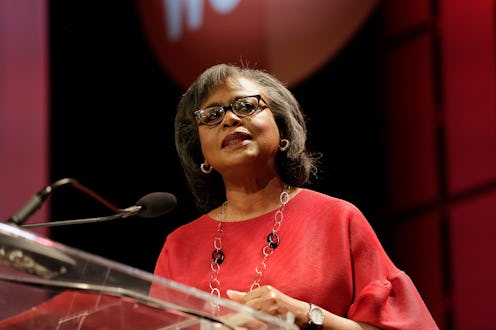News
Why Anita Hill Says This #MeToo Reckoning Isn't Just A "Moment"

It has been 26 years since law professor Anita Hill testified that Supreme Court nominee Clarence Thomas harassed her, spurring a national conversation about sexual misconduct in the workplace. Although Thomas, who denies the allegations, was eventually confirmed, Hill knew the fight wasn’t over. On Friday, Hill explained that #MeToo” is not an isolated event, either, but part of an ongoing dialogue about sexual harassment.
"This is not a moment," Hill explained to a panel for Hollywood executives and actors, "This is a period where we are going to have to continue and put into place some things to make sure we never go back and relive this again."
The current discussion about sexual misconduct and accountability started with the downfall of Hollywood mega-producer Harvey Weinstein, who resigned from his company after The New York Times and The New Yorker published bombshell reports claiming not only that he paid off individuals who accused him of sexual assault and harassment for decades, but also that he hired private investigators to scare off these accusers. Weinstein has denied the allegations of sexual misconduct.
After Weinstein, a flood of women and men started coming forward with their stories, often on social media, using the hashtag #MeToo. The accusations have resulted in the resignations and firings of major television anchors, media figures, and politicians.
But Hill stressed that this progress doesn’t start and end here — both her 1991 testimony and the #MeToo movement, she said, are "part of the arc of history bending toward justice." Hill added that the current movement needs "sustained energy" to survive.
The pushback that Hill faced when she came forward in 1991 feels similar in some ways to criticisms directed toward accusers today. In a Washington Week interview following Hill’s 1991 testimony, Gloria Berger noted that many lawmakers cast doubt on Hill for coming forward so late with her story (the incidents had occurred a decade earlier), saying, "Why didn’t you come forward at the time?" Alabama Senate candidate Roy Moore, who has been accused of sexual misconduct by nearly 10 women, denied the allegations against him and voiced a similar criticism toward his accusers recently, saying, "Isn't it strange after 40 years of constant investigation, that people have waited four weeks before a general election to bring their complaint? That's not a coincidence."
National Women’s Law Center CEO Fatima Goss Graves, who spoke alongside Hill at Friday’s panel, does think more people believe the individuals reporting sexual harassment today than they did 26 years ago. "For the first time when women told their stories, they weren’t immediately dismissed, disregarded, ignored, doubted and shamed," she said, describing the change driven by #MeToo. Graves added that she hopes this means that "We are primed for this to be something that leads to some lasting improvements that will make a difference in the lives of women and girls."
As more men are beginning to face consequences for their actions, some have reconsidered what it means to support powerful men like Bill Clinton, who was accused of rape by Juanita Broaddrick years ago, or even Clarence Thomas, who still sits on the Supreme Court to this day. In an op-ed published by The Washington Post on Wednesday, freelance writer Jay Kaganoff encouraged his fellow conservatives to push Thomas to resign: "In 2017, post-Weinstein, we can’t let sexual harassment slide just because it doesn’t rise to the severity of rape, or because we believe that boys will be boys."
One way that leadership can "show women in the world that equality does matter," as Hill hopes will happen, is helping more female leaders get elected. The year after Hill testified was dubbed "The Year of the Woman," as more women won Congressional seats than any previous decade in history. Many of the women that ran that year were partly motivated to do so after seeing the way Hill was treated.
A similar pattern has played out in the past year. Following Trump’s election, a record number of women have expressed interest in running for office. In November, She Should Run reported that 15,000 women contacted the organization about running for elected office, while EMILY’s List had interest from 19,000 women. Come 2018, more women may be sitting in Congressional seats—and this may help further progress on the fight that Anita Hill started in 1991.